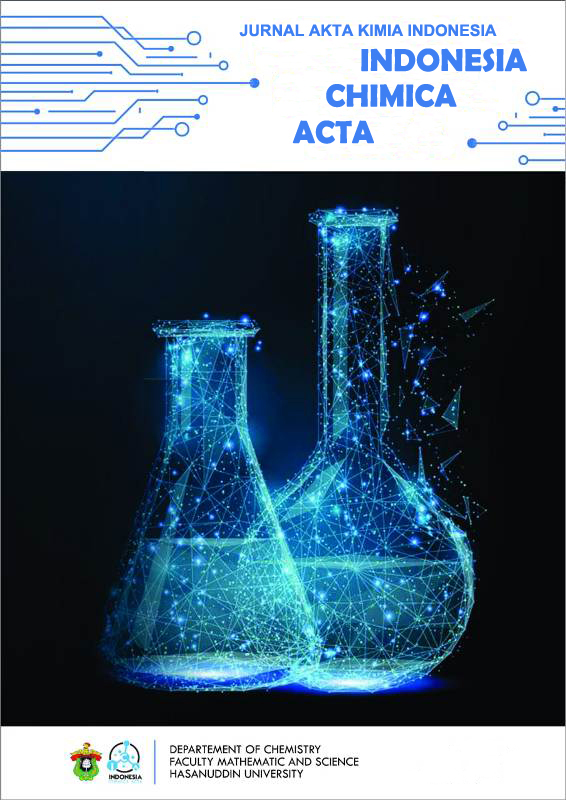PHYTOACCUMULATION OF CHROMIUM(VI) METAL ION BY SNAKE PLANT (Sansevieria tifasciata Prain)
Abstract
Full text article
References
Aiyen, 2004, Importance of Root Growth Parameters to Cd and Zn Acquisition by Nonhyperaccumulator and hyperaccumulator Plants, Disseraion University of Hohenhein, Institutebof Plants Nutrition, Verlag Graner- Meuren-Stutgard.
ASTDR, 2006, Case Studies In Environmental Medicine. Chromium Toxicity, U.S. Departement of Health and Human Services.
Candra, P., Khoirina, D.W., Firdaus, and Maulidin, 2007, Utilization of Heavy Metal Liquid Waste in the Textile Industry for Iron Metal Coating with Electroplating Method, LPPM, Yogyakarta..
Cave, R.L., Butler, O., Chenery, S.R.N., Cook, J.M., Cresser, M.S., dan Miles, D.L., 2000, Atomic Spectrometry Update Enviremental Analysis, J. Anal. At. Spectrom, 16: 194-235.
Fardiaz, S., 2008, Polusi Air dan Udara, Kanisius, Yogyakarta.
Gosh, M., and Singh, S.P. 2005. Comparative Intake and Phytpextraction Study of Soil Induced Chromium by Accumulation and High Biomas Sweed Spesies, Applied Ecology and Enviromental Research, 3(2): 67-69.
Hardiani, H., 2009, Potential of Plants in Accumulating Cu Metal in Soil Media Accumulated by Solid Paper Industry, Phytochemical Journal, 44 (1): 27-40.
Hartanti, P.I., Haji, A.T.S., Wirosoedarmo, R., 2014, Effect of Dichengia (Eichornia crassipes) Plant Density on Chromium Metal Decrease in Liquid Tannery Liquid, Journal of Natural Resources and Environment, 1: 31-37.
Jeliazko, V.D., 2001, Study on Heavy Metals Absorption by Plants, University of Massachusetts Amherst.
Liong, S., Noor, A., Taba, P., Abdullah, A., 2010, Study of Phytoaccumulation of Pb in Land Kale (Ipomea reptans Poir), (Online), (http://www.pustaka.ut.ac .id), accessed on the 20th of November 2015 at 17.00 WITA.
Mimaki, Y., Inoue, T., Sashida, Y., 1996, Steroidal Saponins From Sansevieria trifasciata, Elsevier Science Ltd., 43(6): 1325-1331.
Muliadi, Liestianty, D., and Yanny, 2013, Phytoremediation: Accumulation and Distribution of Heavy Metal Cadmium Nickel and Chromium in Ipomea reptana Plants, Phytoremediation, 1: 1-5.
Nouairi, I., Ammar, W.B., Youssef, N.B., Daoud, D.B.M., Ghorbal, MH., dan Zarrouk, M., 2006, Compaarative Study of Cadmium Efffects on Membrane Lipid Composition of Brassica juncea and Brassica napus leaves, Plant Science, 170(3): 511-519.
Piotrowska-Cyplik, A., dan Czarnecki, Z., 2005, Phytoextraction of Pb, Cr, and Cd by Hemp During Sugar Industry Anaerobic Sewage, Sludge Treatment, Electronic Journal of Polish Agricultural Universites, 8(1): 1-7.
Pradipta, A., 2011, Effect of Extraction Method on the Antibacterial Activity of Ethanol Extract of Sansiveria Leaf Trifasiata Prain Against Staphlococcus aureus IFO 13276 and Pseudomonas aeruginosa IFO 12698, Faculty of Technology, University of Atma Jaya, Yogyakarta.
Purwanto, A.W., 2006, Sansevieria: Beautiful Poisonous Absorbent Flora, Kanisius, Yogyakarta.
Putri, Y.D., Holik, H.B., Musfiroh, I., 2014, Utilization of Ponterideceae as a Phytoremediation Agent in the Processing of Chrome Waste in the Leather Tanning Industry, IJPST, 1 (1): 26-33.
Subroto, M.A, 1996, Phytoremediation. In: Proceedings of the Training and Workshop on the Role of Bioremediation in Environmental Management, Cibinong, 24-25 June 1996.
Yoon, J., Cao, X., Zhou, Q., dan Ma, L.Q., 2006, Accumulation of Pb, Cu, and Zn in Native Plants Growing on A Contamined Florida Site, Science of The Total Envirement, 368(2): 456-464.
Yusuf, M., Zubair, A., and Arsyad, A., 2015, Phytoremediation of Soil-Polluted Pb and Cd Soil Using Using Tongue Mert Plants (Sansevieria trifasciata), unpublished thesis, Hasanuddin University.
Authors
This is an open access journal which means that all contents is freely available without charge to the user or his/her institution. Users are allowed to read, download, copy, distribute, print, search, or link to the full texts of the articles in this journal without asking prior permission from the publisher or the author.
Jurnal Akta Kimia Indonesia (Indonesia Chimica Acta) operates a CC BY-SA 4.0 © license for journal papers. Copyright remains with the author, but Jurnal Akta Kimia Indonesia (Indonesia Chimica Acta) is licensed to publish the paper, and the author agrees to make the article available with the CC BY-SA 4.0 license. Reproduction as another journal article in whole or in part would be plagiarism. Jurnal Akta Kimia Indonesia (Indonesia Chimica Acta) reserves all rights except those granted in this copyright notice.

